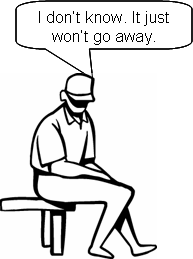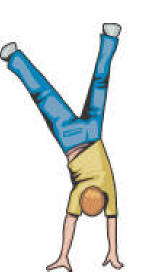STEP
INTO THE GED
PERSONAL
DEVELOPMENT
READING:
Depression - P1
SUPPORT ACTIVITIES IN
READING |
WRITING |
MATH | PROJECT |
FUN
IN THIS UNIT:
Reading Passage and Practice:
Information on Depression
Math: Finding percentages from parts
and whole
Vocabulary: Mental disorders
Writing: The essay and its parts
Project: Interview and
results
Game:
Terms relating to depression disorders

Everyone gets sad at times. We all get upset and disappointed. We talk to a friend or a relative, and pretty soon, we feel better. It's natural to feel sad when we lose someone or something we love, or when we are sick. It isn't dangerous to feel emotions unless they get out of hand.
If anger gets out of hand, it can become violent.


If sadness and grief get out of hand, they can become depression. Depression can be dangerous, too. It can also kill. Depressed people often commit suicide. Sometimes, we don't even know that someone is depressed. Some people can hide depression very well, but not for very long.

If you know why you are sad, you can face your sadness and help yourself work through it. Talking to people who will listen helps a lot. Getting out and doing things you like to do also helps.
Sometimes, people get sad, but they can't stop it. They don't know how they can talk about it. They get ashamed. They stop functioning. The sadness keeps going. It becomes depression. If you ask that person why they are depressed, they probably can't tell you. "I don't know. Nothing makes sense. I can't pull out of it."

When people no longer know why they are sad; when everything seems meaningless; when they don't even want to get out of bed, or go to school, or to church, or to work, they are depressed. They need professional help and, sometimes, even medication.
People can be depressed for many reasons. They may have depression in their families, passed down from generation to generation. They may have a sudden or long-term chemical imbalance. Their depression might have started with an event, like a death, and continued. Only a professional can say for sure.
There are three main types of depressive disorders: major depression (the most severe type of depression), dysthymic disorder (depression that is prolonged and not as intense), and bipolar disorder (depression that results from manic-depressive illness with mood swings).
In addition, women can suffer from postpartum depression. Postpartum means "after birth." Some people call it "the baby blues." That kind of depression tends to be temporary and can be treated with counseling and medication.
Depression makes you feel exhausted, worthless, helpless, and hopeless. These negative thoughts and feelings make some people feel like giving up. Recognize that these negative views are part of depression. They do not reflect who you are or what your life is about. With treatment, negative thinking fades. You begin to feel positive and useful again.
Depression is treatable. Suicide can be prevented. If you are depressed or want to help a friend who is depressed, get help. The problem isn't the person but the imbalances in a person's body. Saying things like, "Let it go," or "Pull out of it," or "Don't let it get to you," doesn't help. So get help!
If you are depressed, don't blame yourself. If your friend is depressed, don't blame her. Get help. Call a doctor or a minister or a counselor. Tell someone what is going on.
If you or your friend feels suicidal, call a Help Line immediately. Call 1-800-784-2433 (1-800-SUICIDE) for the National Hopeline Network. If you have Internet connection, go to http://suicidehotlines.com/ and click on your state to find someone close to you. You probably have a local Crisis Line in your town. Find out what that is and call. People are trained to help!
Once you get help, pat yourself on the back, smile, and prepare to feel better and better!


Brain Gym


What word or phrase is the box below representing? Think before you check the answer.
![]()
![]()
![]()
SUPPORT ACTIVITIES IN
READING |
WRITING |
MATH | PROJECT |
FUN
All rights reserved
© Leecy Wise and Vicky Lara,
authors